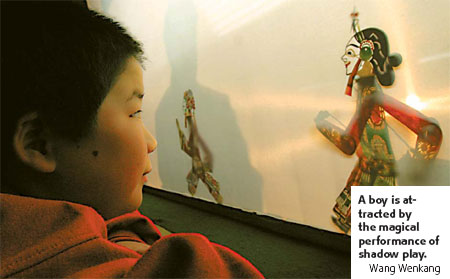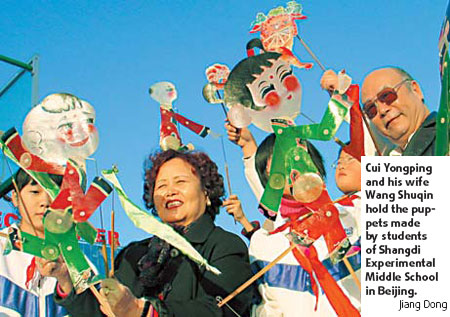He Xin, 13, concentrates on outlining a frog's head on a piece of white cowhide. He cuts around the edges of the drawing and carves out the eyes, mouth and other details on a black-waxed tablet.
"You might hurt yourself if you handle the graver like that," says Cui Yongping, a 61-year-old folk artist who now teaches the teenager. "Hold it upright, prop it up with your middle finger and process the hide bit by bit."
From time to time, He looks up at a vivid leather-silhouette frog Cui brought to the class. He imagines that one day he will perform with the silhouette puppets he makes himself.
The student of Beijing's Shangdi Experimental Middle School takes a 90-minute shadow play (piying) class every Monday afternoon. The course is jointly run by the school and two artists from the Beijing Shadow Play Troupe - Cui and his wife Wang Shuqin.
He had heard a little about the art genre from his grandfather, who was also a shadow play performer. "But grandpa is in his 80s and is too sick to perform. I had never seen a play," he says.
"I registered for the course's second session, because I wanted to know why grandpa is so enthusiastic about this."
He was enrolled in the class with other 17 students in September. Weeks ago, they, together with students of the first-session class, gave two silent shows for a group of hearing-impaired children.
"At first, the rehearsal was a mess. More than 10 energetic children walked onstage, not knowing what to do. They had to keep checking the script to see whose characters would act next. They didn't know how to move the silhouette puppets on the screen," Cui says.
"But they surprised us in the formal show with a still inexperienced, but very touching, presentation. They must have devoted a lot of time after the class," adds Wang Shuqin.
Wang Weihua, the course's assistant teacher, says that students not only expand their knowledge of traditional arts, but also can participate in them. It helps them improve creativity and develop a sense of teamwork.
As a reward, Cui and his wife invited the students to their home in the capital's southern outskirts. Their apartment, also a small museum of shadow puppets, has recently been in the spotlight, since Cui was designated a "folk art ambassador" of Tongzhou District.
With a history of about 2,000 years, the art of shadow play has had an important place in Chinese tradition. Illuminated puppet figures are manipulated by puppet masters, who stand behind a translucent white cloth screen. These performances combine vocal arts, music, fine art and craftsmanship.
Cui became an apprentice of the Beijing Shadow Play Troupe in 1960. He was then a collector of ancient books, all of which were lost during the "cultural revolution" (1966-76). In the late 1970s, he started to collect puppets, antique scripts, hide, tools and anything else he could get his hands on related to shadow plays.
Cui used to travel around the country in search of the best silhouette puppets of different genres before they were dumped like trash. He was impressed by the large number of rural vendors who sold silhouettes for a living in Xi'an, capital of Shaanxi Province.
"What they showcased on the street should have been preserved in museums, instead of being damaged, thrown away or bought at low prices," he says.
Cui also reached remote and destitute villages that were home to a treasure trove of folk handicrafts. One time he was stuck on a rugged, remote road in Huaxian County, Shaanxi, and had to bind himself with a rope and be pulled up the mountain slope by a tractor.
"He is obsessed with the craft," says Wang Shuqin. "He will eat only corn to save money for the next trip or puppet purchase."
The couple often talks about their first business tour through Europe in 1983. Surprisingly, they saw abundant collections of exquisite Chinese puppets in several museums. It was not until then that they realized there was no specific museum for shadow plays back home.
"I was invited to a German museum to clarify the genres of its Chinese puppets. I felt sad, and I said to myself, there is no reason that we don't have one. If no one is going to do it, then I will," Cui says.
Just when the couple had saved up enough money for a museum, a severe stroke almost took Cui's life in 1991. The medical treatment drained their savings, and even after Cui recovered two years later, he was not the same. He struggled for words before talking and sometimes spoke in broken dialogue.
However, once on stage, Cui still delivered vivid and fluent performances.
For the six or seven years afterwards, the couple tried everything to earn and save the money. They even ran a small grocery store while also performing shadow plays in embassies.
In April, 2004, they bought three apartments and changed them into the Cui Yongping Private Shadow Play Art Museum. In an area of 250 sq m, the museum houses about 30,000 puppets representing different periods and regional characteristics. Among them are around 1,000 invaluable silhouette gems dating back to the Ming Dynasty (1368-1644).
The exhibition halls only display one third of Cui's puppets, settings, ancient scripts, tools, instruments and old photos. Cui's immense collection has attracted not only visitors but also potential buyers. He once declined an offer of $100,000 for a stunning unit of leather-silhouette settings, which depict scenes from Chinese fairly tales.
Every week, the couple presents puppet shows at the museum's small theater, which can hold 50 people. Almost 80 percent of their visitors are expats, and many of them become Cui's students and help promote the age-old craft across the world.
Cui is not ready to retire yet and plans to start a troupe for Tongzhou's rural residents. He wants to promote shadow play courses to kindergartens, schools and universities. He also hopes to establish a chain of museums across the country and someday abroad.
"It is too big of a responsibility for the couple to shoulder," says Cui's friend Yang Jianying.
"More people should join in, and hopefully, Cui will find an inheritor to continue his work."
(China Daily November 29, 2007)



